Mannington hardwood floors are inspired by global influences, but interpreted with American home furnishing trends in mind. Choose from any collection for designs that look great and perform beautifully. Learn More
Solid Hardwood Flooring
Solid Hardwood Flooring Guide

The Ultimate Solution for Business Owners, Property Managers, and Facility Managers
Durability, Elegance, and Long-Term Value in One Flooring Option
Solid hardwood flooring is renowned for its timeless appeal, durability, and ability to elevate any space. For Business Owners, Property Managers, and Facility Managers, selecting the right flooring is not just about aesthetics; it’s a strategic decision that impacts functionality, maintenance costs, and long-term investments. Solid hardwood flooring stands out as an ideal choice, meeting the unique needs of commercial spaces while offering unmatched quality.
What Is Solid Hardwood Flooring?
Solid hardwood flooring is crafted from a single piece of hardwood, typically ranging from 3/4 inch to 1 inch thick. Made from 100% natural wood species like oak, maple, or cherry, it provides a sturdy and stable surface that can withstand the rigors of daily use, heavy foot traffic, and long-term wear and tear. It can also be sanded and refinished multiple times, ensuring longevity and allowing for restoration or stylistic changes as needed.
This flooring solution offers not only functionality but also a wide range of aesthetic options, as each plank showcases the natural grain, patterns, and beauty of the wood species used. Solid hardwood flooring complements various interior design styles, whether traditional, contemporary, or modern.
Features and Benefits of Solid Hardwood Flooring
- Durability and Longevity
Why It Matters: Business Owners and Facility Managers require flooring that withstands heavy foot traffic and the day-to-day demands of commercial spaces. Solid hardwood flooring, when maintained correctly, can last for decades. It can be refinished multiple times, giving it a significantly longer lifespan compared to other flooring options. - Improved Indoor Air Quality
Why It Matters: Solid hardwood floors do not trap dust, pollen, or allergens, creating a healthier environment—an essential factor for Property and Facility Managers overseeing spaces where air quality directly affects occupant well-being. - Aesthetic Versatility
Why It Matters: Property Managers are often tasked with making commercial and residential spaces look appealing to tenants and visitors. The classic elegance of solid hardwood flooring complements any interior design, and with a wide range of finishes and wood species available, it can be customized to match specific aesthetic requirements. - Return on Investment
Why It Matters: For Business Owners, the cost-efficiency of solid hardwood flooring lies in its long-term value. It increases property value, attracting potential buyers or tenants who seek high-quality, durable materials. Additionally, because it can be sanded and refinished, the need for replacements is minimized. - Sustainability
Why It Matters: Business Owners and Facility Managers focused on sustainability will appreciate solid hardwood flooring's eco-friendly aspects. As a natural material, responsibly sourced hardwood flooring contributes to reducing a business’s environmental footprint.
Why Solid Hardwood Flooring Stands Out
Solid hardwood flooring distinguishes itself from other types of flooring due to its unparalleled durability and ability to be refinished multiple times. Unlike engineered wood or vinyl options, solid hardwood offers a thicker surface that can be sanded down, allowing for restoration even after years of wear.
Additionally, solid hardwood offers a unique level of aesthetic authenticity. Each plank is a natural product, showcasing individual grain patterns and colors that cannot be replicated by synthetic alternatives. The quality and craftsmanship of solid hardwood make it an ideal choice for high-end spaces, whether they are commercial offices, residential buildings, or facilities.
Appropriate Rooms for Solid Hardwood Flooring
Solid hardwood flooring is most suitable for areas where moisture and humidity are not a concern. The following spaces are ideal:
- Commercial Offices and Lobbies: Its elegant appearance enhances the professional atmosphere of high-traffic areas.
- Residential Living Rooms and Bedrooms: Hardwood flooring adds warmth and charm, creating a welcoming environment for tenants.
- Boardrooms and Conference Rooms: Solid hardwood imparts a prestigious and sophisticated look, elevating the interior design.
- Retail Spaces: In retail settings, hardwood's durability and aesthetic versatility can create an inviting atmosphere that encourages foot traffic.
However, it’s important to note that solid hardwood is not suitable for areas prone to high moisture, such as bathrooms, basements, or kitchens, where the risk of warping or buckling is higher.
Invest in Quality and Longevity with Solid Hardwood Flooring
For Business Owners, Property Managers, and Facility Managers looking to make an investment that guarantees long-term value, solid hardwood flooring is the answer. Its durability, aesthetic versatility, and ability to improve air quality make it a premium choice for commercial and residential spaces alike. With its potential for refinishing and sustainability, solid hardwood offers a solution that stands the test of time.
Explore your options today and choose solid hardwood flooring to enhance the performance and beauty of your space.
Disclaimer: The information provided in this article is for general informational purposes only. While we strive to ensure the accuracy and reliability of the information presented, we make no warranties, express or implied, about the completeness, accuracy, reliability, suitability, or availability with respect to the content. Any reliance you place on such information is strictly at your own risk. We recommend consulting with professionals for specific advice tailored to your project’s needs, particularly regarding building codes, regulations, and product specifications.
Under no circumstances shall we be liable for any loss or damage, including without limitation, indirect or consequential loss or damage, arising from the use of, or reliance on, the information provided in this article.
Solid Hardwood Flooring
Top 8 Types of Solid Hardwood Flooring
 Wood Flooring - 362 Exotic Hardwood FlooringExotic wood flooring ranges from Brazilian Cherry to Tigerwood and many, many other spices. Exotic hardwood floors can be a bit more costly than domestic wood flooring but its offers something unique and interesting. | |
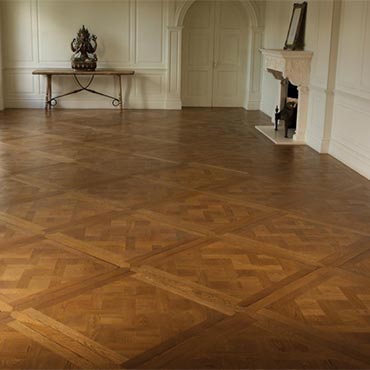 Wood Flooring - 837 Parquet FlooringParquet flooring is a timeless option that brings warmth and character to any home. Wood parquet flooring offers a mosaic of inlaid wood tile forming repeating squares and triangular patterns from short strips of wood. | Sub Categories: |
 Wood Flooring - 363 Antique Wood FlooringDiscover how Antique Wood Flooring offers a perfect blend of history, craftsmanship, and sustainability, making it an ideal choice . | |
 Wood Flooring - 848 Hand Scraped Wood FloorsHand-scraping is the most-common distressing technique used to achieve a worn look. Distressing offers an antiqued appearance. | |
 Wood Flooring - 361 Acrylic Impregnated Wood FlooringDiscover Acrylic Impregnated Wood Flooring: a durable, moisture-resistant, and stylish choice perfect for interior designers and decorators seeking long-lasting elegance. | |
 Wood Flooring - 948 Distressed Wood FlooringThe hand scraped look of distressed hardwood flooring is an excellent option. It will provide a unique and rustic look to any room and hold up in high traffic areas by hiding normal wear and tear, like scuff marks and scratches. | |
 Wood Flooring - 853 Hardwood Strip FlooringHardwood strip flooring is a beautiful product that gives a room a nostalgic feel of 1940s and 50s. Unlike other types of hardwood flooring, this hardwood flooring uses narrower strips to provide a stylish look to any home. | Sub Categories: |
 Wood Flooring - 850 Hardwood Plank FlooringHardwood plank flooring can easily change the look of any open floor plan. Accent your hardwood plank flooring with area rugs and runner rugs to bring additional color, comfort and a lived-in look to your home. | Sub Categories: |
Featured Brands
The Best 10 Solid Hardwood Flooring Brands
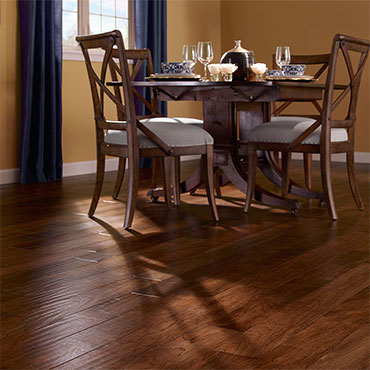

Bruce Hardwood Flooring
Profile | Website | Warranty | InstallHardwood flooring can be an ideal flooring choice for just about any area of your home. Bruce hardwood floors are available in many colors and looks to match any style and decor. Browse our wood flooring to find wood floor that's perfect for you. Learn More
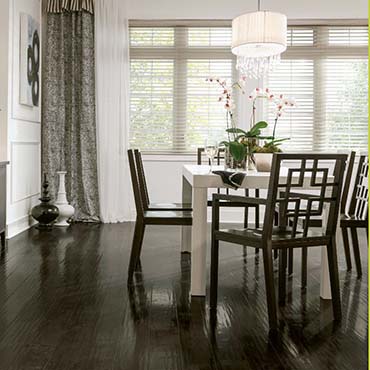
Armstrong Hardwood Flooring
Profile | WebsiteExpertly crafted using the finest domestic and exotic hardwoods. From the rustic, old-world charm of hand-scraped hardwoods to the more classic, traditional hardwood floors sanded to smooth perfection. Learn More
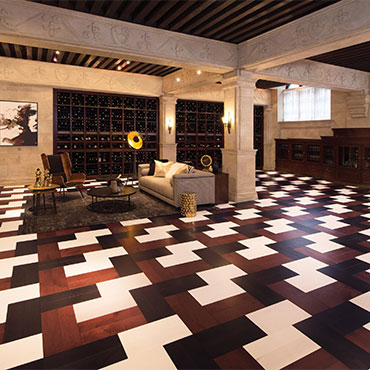
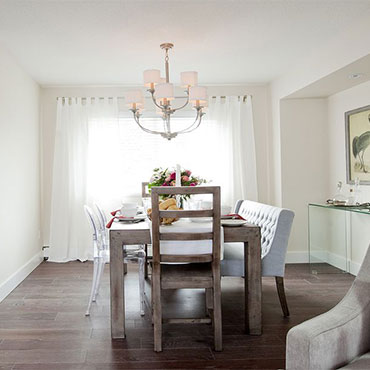
Mercier Hardwood Flooring
Profile | Website | Warranty | Install | MaintainRed Oak (Quercus rubra) has a distinctive, textured grain with clearly visible growth rings. Its colour ranges from a slightly pinkish beige to a reddish brown. The colour of Red Oak moderately changes over time becoming lightly amber in hue. This wood has a Janka hardness rating of 1290. Learn More
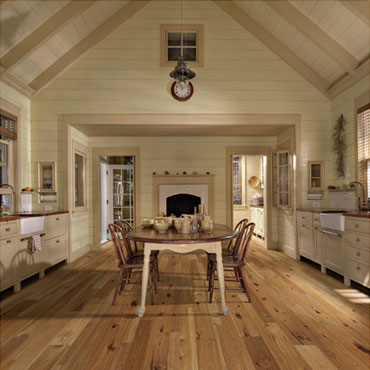
Monterey Hardwood Collection
Profile | Website | Warranty | Install | Maintain | FAQsRanchero Hickory – The Monterey Hardwood Collection was designed with a historical, European influence making it simply savvy & perfect for today’s trends. This collection captures the beauty of nature, developed using tomorrow’s technology to create a new demand for random width planks. Learn More
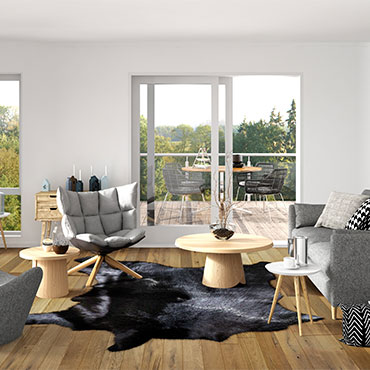
Johnson Hardwood Flooring
Profile | Website | Warranty | Install | Maintain | FAQs | GreenReflective of the Blue Ridge Mountains and warm autumn toned leaves, our Blue Ridge Collection offers a subtle design statement. Hand selected, character grade hardwoods featuring four distinct color visuals with a unique mix of naturally occurring knots and mineral streaks. Learn More
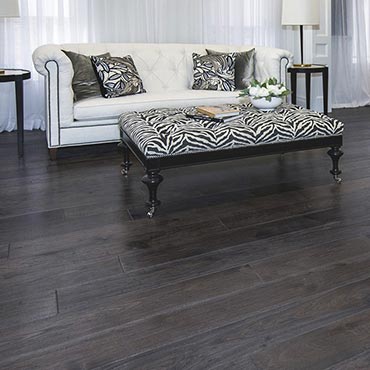
Vintage Hardwood Flooring
Profile | WebsiteVintage Hardwood Flooring offers high-performance, sustainable prefinished wood solutions. Featuring over 100 colors, low-VOC finishes, and advanced structural options like Northern Solid Sawn, they provide specification-ready flooring for luxury and commercial projects. Learn More


Solid Hardwood Flooring Videos
The Top 2 Solid Hardwood Flooring Videos
Mannington Hardwood ScratchResist(TM)
Made in South Pittsburg: Shaw Hardwood Flooring
Solid Hardwood Flooring News
Latest Solid Hardwood Flooring News
Solids Hardwood Flooring...TRIÂNGULO® Exotic Solid wood flooring is fabricated from 3/4″ thick solid wood and has tongue and groove sides to join the boards. The truly random nature of our exotic solid hardwood flooring will ensure that no application will look alike. The Triangulo crystal clear pre-finishing process applies as many as 9 coats of Aluminum Oxide for maximum durability and enhanced beauty. L... |
Ultimate Guide to Hardwood Flooring...tion! Before you decide on hardwood, here's what you need to know. Hardwood Flooring Options There are three types of hardwood floors available to you: Solid Hardwood Flooring: Solid hardwood flooring is a solid piece of wood from top to bottom. The most popular species are oak, maple, hickory, and brazilian cherry hardwood flooring. |
Solid Hardwood vs. Engineered Wood...c="https://www.armstrongflooring.com/content/dam/armstrongflooring/residential/images/product-structure/hardwood_solid_illustration.jpg" style="float: right" width="150">Many homeowners aspire to own solid hardwood flooring for its authenticity, timelessness and durability. Our solid hardwood flooring is constructed with 100% hardwood and each plank is a single solid piece. At Armstrong Fl... |
Engineered Hardwood Flooring...rite among designers. Whether it's creating a cozy, rustic ambiance or complementing a sleek, modern decor, engineered wood effortlessly elevates the aesthetic of any room. Engineered vs. Solid Hardwood FlooringWhen comparing Engineered to Solid Hardwood Flooring, several factors stand out. Engineered flooring offers greater resistance to moisture and temperature variations,... |
Solid Hardwood Flooring...Solid Hardwood Flooring: A Timeless Choice in Modern Interior Design In the ever-evolving world of interior design, solid hardwood flooring stands as a testament to both tradition and modernity. Its timeless elegance, combined with a range of versatile options, makes it a favored choice among interior designers, decorators, and design consultants. This article delves into the t... |










